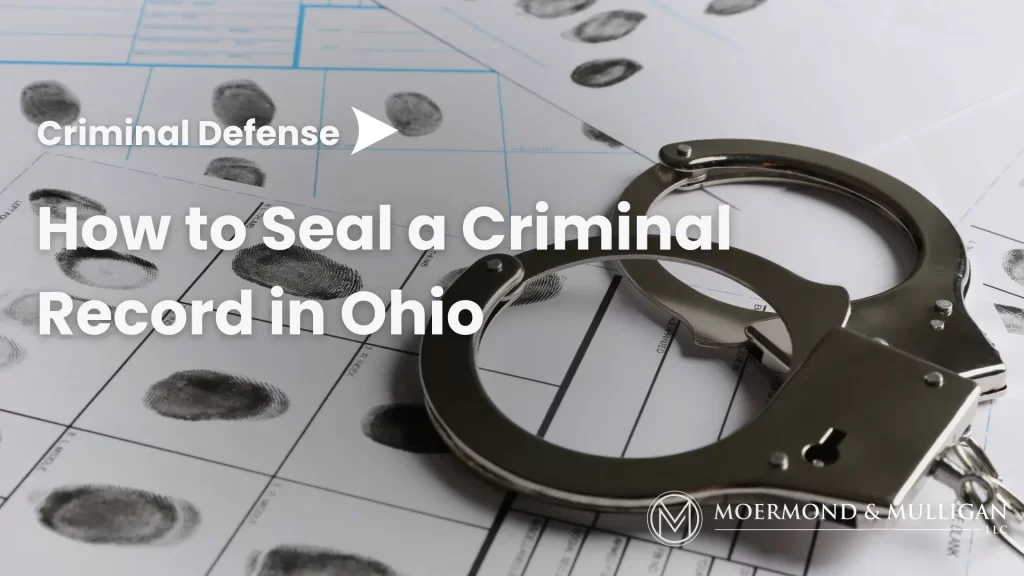Posted on Monday, April 1st, 2024 at 9:00 am
 If you have a record for a criminal offense in Ohio, you may wonder, “How do I get my record sealed?”. Depending on the nature of the offense, you may be eligible to have the case records sealed or even expunged. Don’t know what is the Second Chance Law in Ohio? In Ohio, record sealing makes the case records unable to be viewed by the public, and expungement eliminates the records as if they never existed.
If you have a record for a criminal offense in Ohio, you may wonder, “How do I get my record sealed?”. Depending on the nature of the offense, you may be eligible to have the case records sealed or even expunged. Don’t know what is the Second Chance Law in Ohio? In Ohio, record sealing makes the case records unable to be viewed by the public, and expungement eliminates the records as if they never existed.
Because laws concerning record sealing have recently changed and will likely continue to evolve, it is critical to have an experienced Cincinnati criminal defense attorney assist you in properly handling your criminal case and applying to have your records sealed as soon as you are eligible.
Can You Seal a Criminal Record in Ohio?
Yes, you can seal a criminal record in Ohio. Due to recent changes in the law, you may now be able to seal your record even if you were previously ineligible. Sealing a record is different from expungement because the record still exists – it is not erased or deleted.
Although a sealed record still exists, having the record sealed may help you get some jobs or apply to lease property, as most employers and landlords cannot see a sealed record. However, an employer can view your sealed records if you apply for certain jobs, such as law enforcement or childcare. Further, if you are a suspect in a subsequent criminal investigation, law enforcement, the prosecution, and the court can see your sealed records.
To be eligible to seal a record, you cannot have any open or pending criminal cases and all fines and restitution must be paid in full. Examples of these can include warrants or traffic violations. Certain waiting periods after criminal convictions must expire before you can petition the court to seal your records.
Although the law was expanded to allow more records to be sealed, specific categories of crimes remain ineligible to be sealed. This includes first and second-degree felonies such as murder and rape, traffic offenses, domestic violence convictions, and violations of protection orders. This also includes crimes against children under age 13, and any sex crimes requiring you to register.
Sealing a Criminal Record Under the New Law
 What is the Clean Slate Law in Ohio? Effective April 4, 2023, Senate Bill 288 was codified. This created significant changes in the sealing and expunging of criminal records in Ohio. This includes conviction records, not-guilty findings, bail forfeitures, and dismissed charges.
What is the Clean Slate Law in Ohio? Effective April 4, 2023, Senate Bill 288 was codified. This created significant changes in the sealing and expunging of criminal records in Ohio. This includes conviction records, not-guilty findings, bail forfeitures, and dismissed charges.
What is the new law for expungement in Ohio? Under the new Ohio law, specific changes broadening the eligibility for expunging or sealing were implemented, including:
- Up to two felonies of the third degree, various felonies of the fourth and fifth degrees and minor misdemeanors can apply for sealing.
- Courts can seal bail forfeiture at the time of forfeiture.
- Tier 1 Registered sex offenders can apply five years after the court rules they no longer have to register. As long as the offense was a third-degree felony or lower and the victim was older than 13, you can apply for expungement among other caveats.
Additionally, under ORC § 2953.32, you can:
- Expunge up to five 4th and 5th-degree felonies
- Expunge unlimited misdemeanors
Your expungement might be limited under the following exceptions:
- You have been convicted for violent or sexually-oriented felonies
- Your misdemeanor offenses were for violent crimes
- You have 1st, 2nd, or 3rd-degree felonies
Expungement or Sealing Process
Certain waiting periods exist before you can apply to have your record sealed. The length of the waiting period depends on the offense. For example, you can apply to have records related to findings of not guilty. This can also be done for a successful completion of intervention instead of conviction at any time. In addition, dismissals with prejudice or without prejudice can be expunged. However, a felony of the third degree requires a waiting period of three years after the person’s final discharge. In contrast, a felony of the fourth or fifth degree requires one year. Misdemeanor convictions carry a waiting period of one year after final discharge.
Courts must conduct hearings on Applications for Sealing or Expungement within 45 to 90 days after the application is filed. The prosecutor may file a written objection to your application, but you still must go to your sealing hearing.
At the hearing, you and your attorney will explain how your criminal record is affecting your life. For example, your record can make it difficult to find a job or secure an apartment. The judge will consider your argument and the prosecutor’s objection while assessing your rehabilitation before ordering your records sealed. Having an attorney assist you can be critical to receiving the positive outcome of record sealing that you desire.
Contact an Ohio Criminal Defense Attorney Today
Need to have your criminal records sealed or expunged? As an eligible offender, you can apply the expungement law to have your records sealed. If you need a criminal defense lawyer in Cincinnati, you need Moermond & Mulligan, LLC. We understand that facing criminal charges can be a challenging time in your life. If you need help fighting criminal charges or want to seal a criminal record, contact us online or call us today at (513) 421-9790 to speak to our team of criminal defense attorneys for a free consultation.
Related Posts:
Written By: Moermond & Mulligan, LLC
Last Updated: 06-12-2025